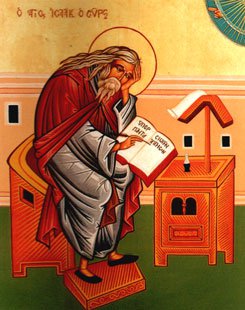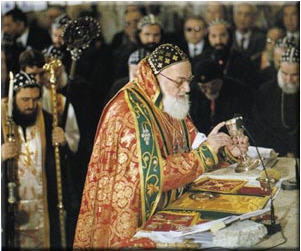Most modern Christians tend to view the early centuries of church history in terms of the two great traditions of the Latin West and Greek East. This approach is incomplete, however, as it neglects the great Coptic, Armenian and Syriac churches, all of which developed unique theological, artistic and liturgical traditions. The Syriac tradition in particular, from its centers in modern day Syria, Iraq and Iran, extended as far as India and China. Although influenced by Byzantine culture, the Syriac church has always maintained its direct connections to the earliest Christian Aramaic communities of New Testament times. The unfortunate divisions in the church following the Christological controversies of the fifth century, followed by the Muslim conquest, left Syriac Christians isolated from the Greek and Latin churches for many centuries. Sadly, over the past quarter century, the homelands of these Syriac Christians in the Middle East have become devastated by armed conflict, and they are often in the news as refugees and victims of war, but with little reference to or understanding of their ancient culture. In recent years, the rich patristic Syriac heritage, epitomized by authors such as St. Ephrem and St. Isaac of Nineveh, is fortunately becoming better known. Besides these two authors, whom I hope to talk about in future posts, there are many others whose writings can contribute important insights to the relationship of the Eucharist to prayer and the Christian vocation.

St. Isaac of Nineveh
One such figure is Bishop Philoxenus of Mabug, who lived in the sixth century. In a letter to a friend, he considered the question of whether sinners despite their faults still retain the presence of the Holy Spirit. Philoxenus answers the question with reference to the Eucharist, which he refers to as the Holy Mystery. Our baptism bestows upon all Christians an indelible “sonship,” which our sinful actions do not erase. The Holy Spirit remains within us, and moves us to repentance. The words of the liturgy make this abundantly clear. Neither priest nor people are without sin, which is exactly why they need the Eucharist. All Christians are imperfect, but nevertheless are still temples of the Holy Spirit and children of God, a fact which enables us to dare to pray the Lord’s Prayer before approaching the Holy Mystery. Philoxenus argues that it is imperative we remain confident that despite our sinful tendencies and actions, God is still with us, and that the healing action of the Eucharist deepens this bond:
“ Now, in as much as a sinner receives our Lord’s Body and Blood in faith, he is in our Lord, and our Lord is in him, as our Lord himself says; and where the Lord dwells, there is his Spirit too.”

St. Philoxenus
The relationship of the Eucharist to all forms of prayer is brought out very well by the sixth century monk Sahdona, sometimes known by the Greek name Martyrios. In his most important work entitled The Book of Perfection, Sahdona describes how prayer “polishes away the rust of the mind.” Prayer is not merely a vocal or even mental activity, but to use imagery central to Syriac spirituality, an interior offering of the heart. Such a movement towards God of our whole being results from the descent of the Holy Spirit into our hearts:
“ The fire of the Spirit will consume our sacrifices and raise up our mind along with them to heaven; then we shall see the Lord, to our delight and not to our destruction, as the stillness of his revelation falls upon us and the hidden things of the knowledge of him will be portrayed in us.”
This action of the Spirit on our heart parallels the descent of the Holy Spirit on the bread and wine during the Eucharistic prayer. At this moment, our own prayers and personal sacrifices become perfectly united to those of Christ, and Jesus is more accessible to us than at any other time. Such an encounter with the Trinity cannot leave us unchanged. The key to living the Christian vocation is to extend this liturgical union with God into every aspect of our daily lives. As the eighth century ascetic Joseph the Visionary states in this excerpt from a prayer for use before holy Communion, the Spirit of God must become as important to us as the very air we breathe:
“And now, when your Spirit descends from heaven upon your Mysteries, may I ascend in spirit from earth to heaven. At this time when your power is mingled in with the bread, may my life be commingled with your spiritual life. At this moment when the wine is changed and becomes your blood, may my thoughts be inebriated with the commixture of your love….Create in me a pure heart so that your holy power may reside within me, so that, through the power of your Spirit I may in a spiritual fashion inhale your salvation.”

All quotations taken from Sebastian Brock, The Syriac Fathers on Prayer and the Spiritual Life (Cisterican Publications, 1987).

Very timely!
LikeLiked by 1 person
Thank you!
LikeLike